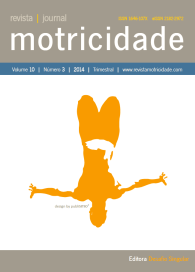Effects of the amount and schedule of varied practice after constant practice on the adaptive process of motor learning
DOI:
https://doi.org/10.6063/motricidade.2905Abstract
This study investigated the effects of different amounts and schedules of varied practice, after constant practice, on the adaptive process of motor learning. Participants were one hundred and seven children with a mean age of 11.1 ± 0.9 years. Three experiments were carried out using a complex anticipatory timing task manipulating the following components in the varied practice: visual stimulus speed (experiment 1); sequential response pattern (experiment 2); and visual stimulus speed plus sequential response pattern (experiment 3). In all experiments the design involved three amounts (18, 36, and 63 trials), and two schedules (random and blocked) of varied practice. The experiments also involved two learning phases: stabilization and adaptation. The dependent variables were the absolute, variable, and constant errors related to the task goal, and the relative timing of the sequential response. Results showed that all groups worsened the performances in the adaptation phase, and no difference was observed between them. Altogether, the results of the three experiments allow the conclusion that the amounts of trials manipulated in the random and blocked practices did not promote the diversification of the skill since no adaptation was observed.
Downloads
Published
Issue
Section
License
The authors of submitted manuscripts must transfer the full copyright to Journal Motricidade / Sílabas Didáticas Editions. Granting copyright permission allows the publication and dissemination of the article in printed or electronic formats, and copyrights start at the moment the manuscript is accepted for publication. It also allows Journal Motricidade to use and commercialise the article in terms of licensing, lending or selling its content to indexation/abstracts databases and other entities.
According to the terms of the Creative Commons licence, authors may reproduce a reasonable number of copies for personal or professional purposes, but without any economic gain. SHERPA/RoMEO allows authors to post a final digital copy (post-printing version) of the article on their websites or on their institutions' scientific repository.


